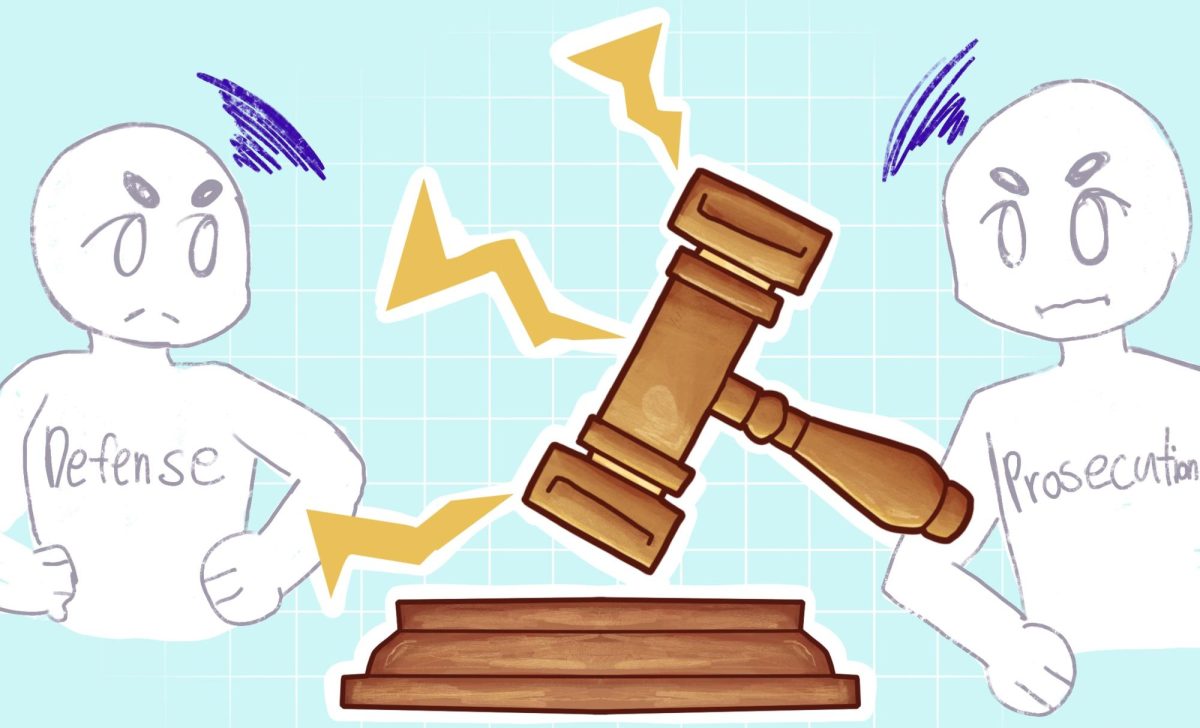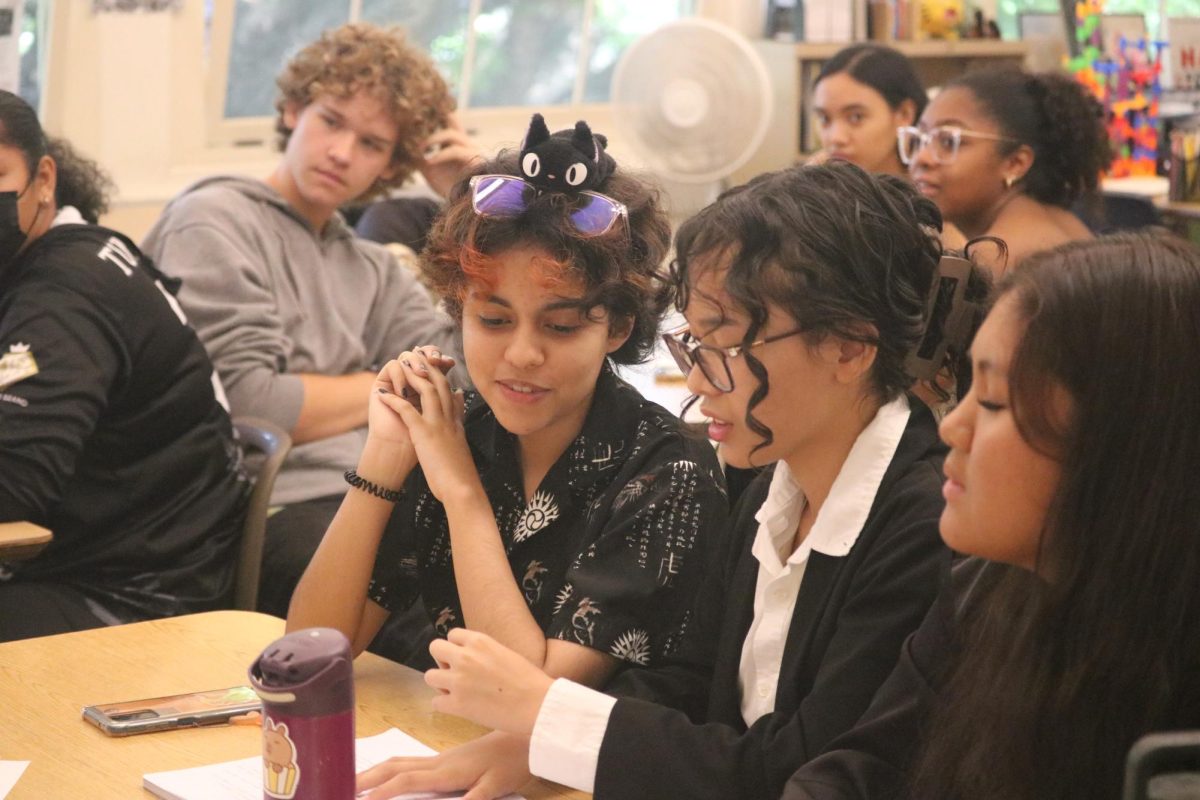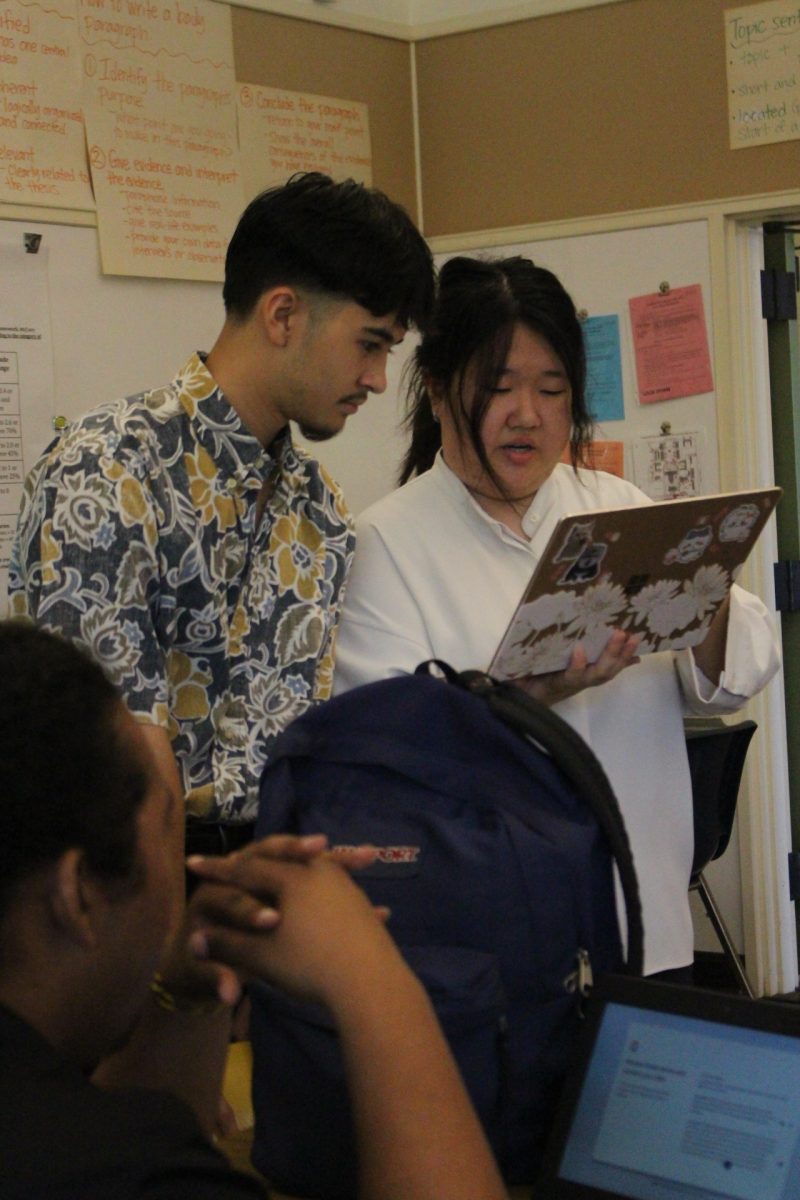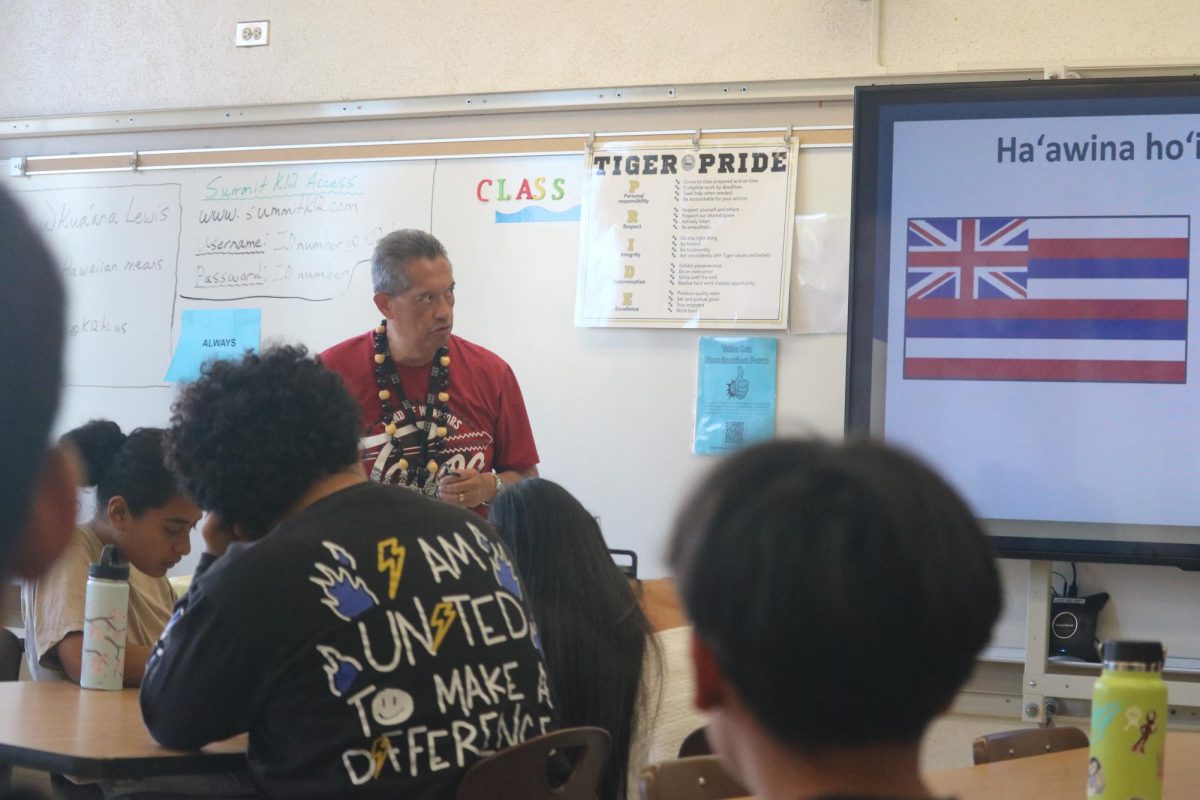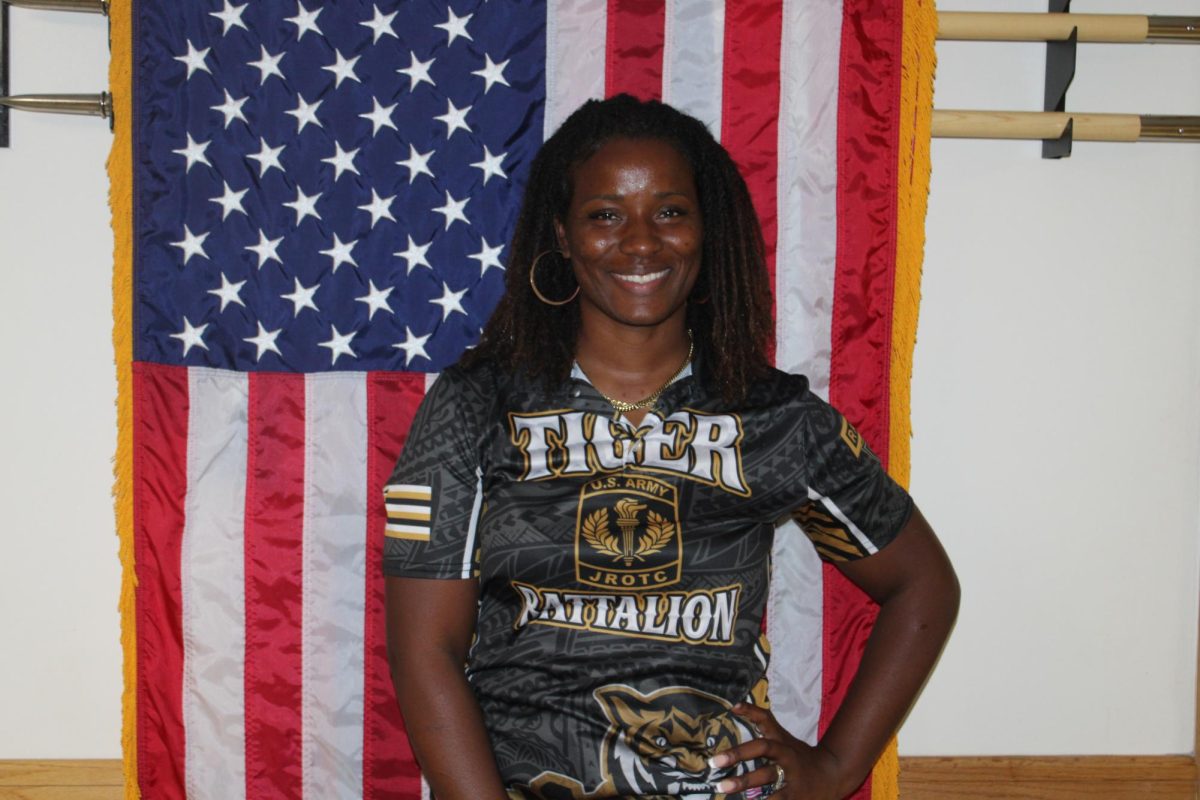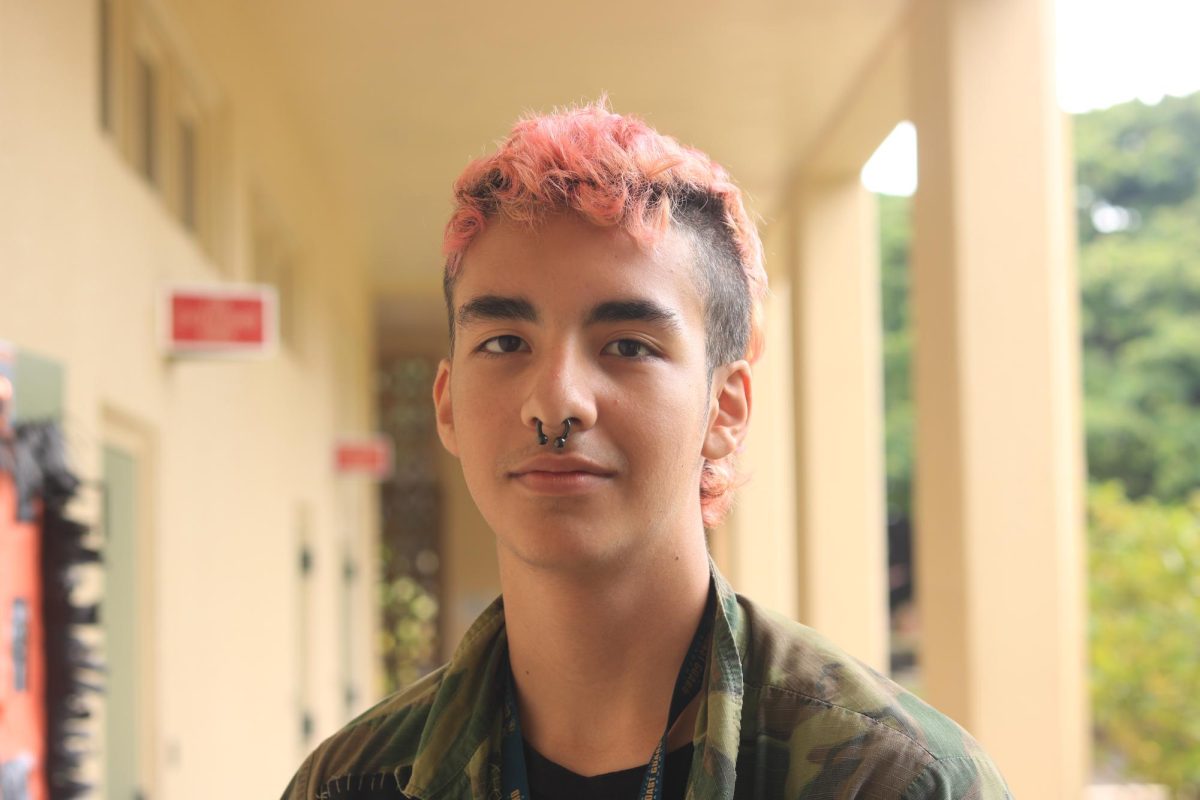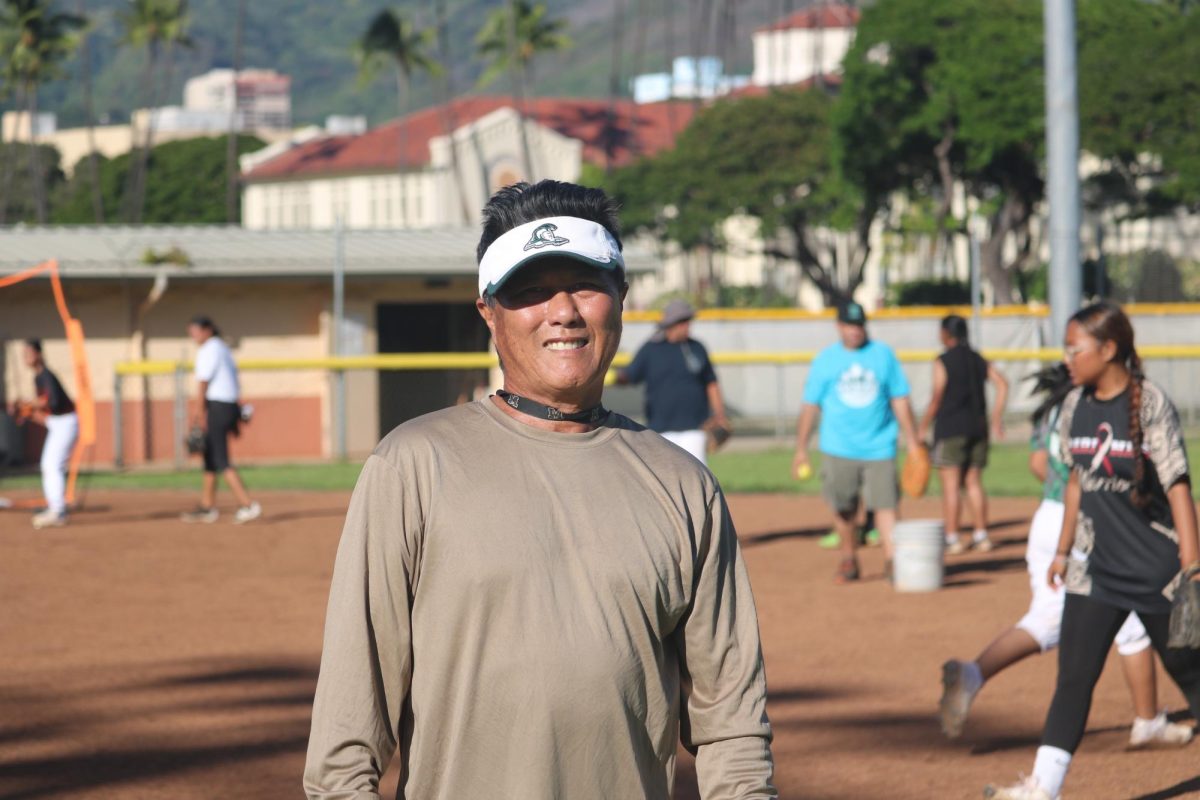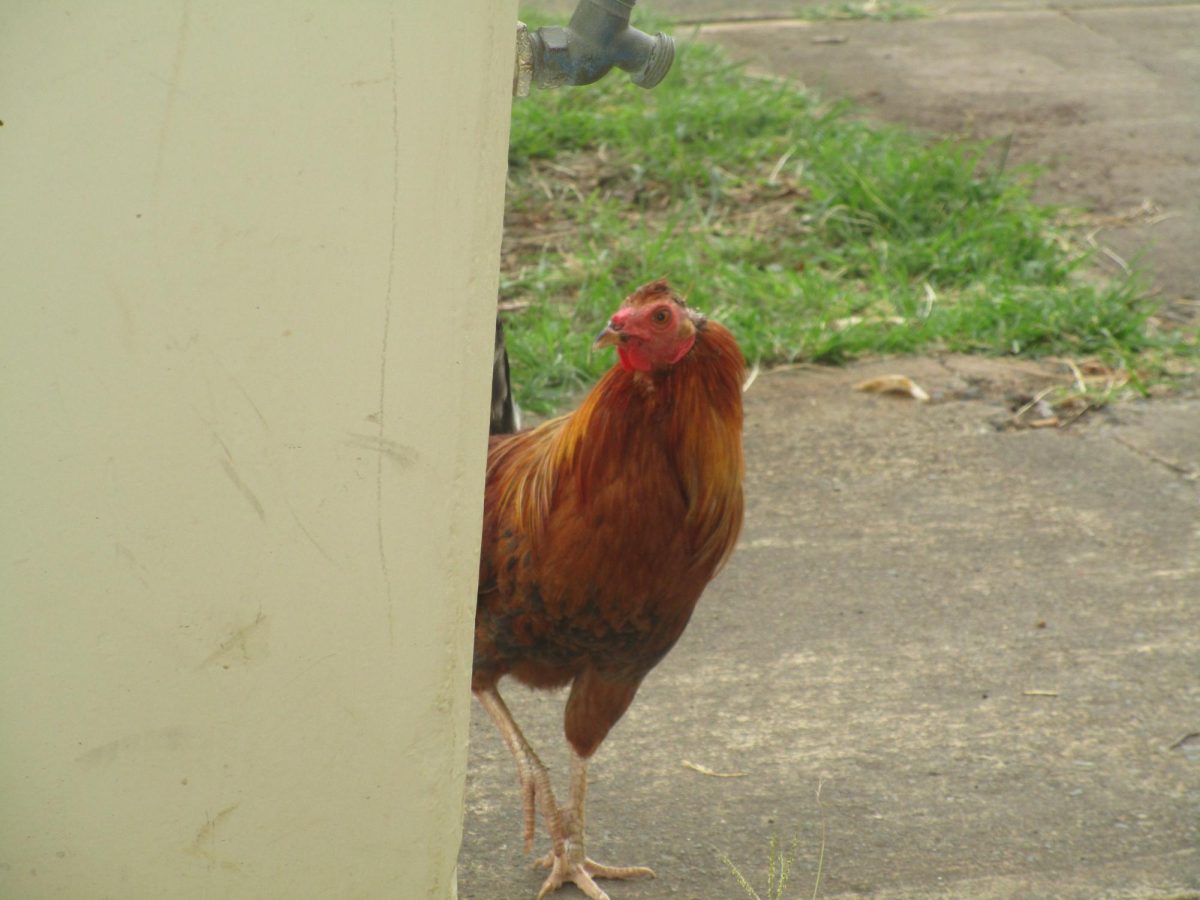Guilty or Not Guilty?: Tanaka’s 10th Grade Honors Takes Odysseus To Court

Guilty or not guilty? That is the question 10th grade English honor students of W226 are trying to answer in their mock trial case of “The Odyssey.” Students prepare to take on the roles of the prosecuted, prosecutors, lawyers and witness while researching and finding evidence to build their case. Irene Tanaka, 10th grade English and Honors Teacher, is the brains behind it all. Having done this for four years, this year will become the fifth. As the trial comes on April 29, May 1 and May 6, students choose their roles and prepare cases. And once the day of the trial arrives, students take to the stands of the classroom to settle the score.
“They have to show me understanding of character analysis, the TED Talk mannerisms they learned in quarter 2 and research skills which they did in quarter 1,” Tanaka said. “They also need to demonstrate group work and the things that you don’t learn out of a book, like how to work together as a team and how to help each other out.”
Tanaka started with an idea during a crime scene investigation (CSI) unit in the pandemic for a different Greek tragedy “Antigone”. She received positive feedback from her students as they said it was good, but wanted to see what happened after they did the police report. Tanaka used to be part of mock trials back in high school, so she called up her old mock trial coach who then gave her ideas on how to conduct the mock trial for her classes.
“I thought it would be a good way for students to exercise knowledge on what it takes to persuade, argue and defend a point of view,” Tanaka said.
Tanaka chose “The Odyssey” as opposed to other Greek Myths such as “The Twelve Labors of Heracles” because it is easier to focus on since it only has one main character; “The Twelve Labors of Heracles” on the other hand had too many side characters and side quests.
“I felt that if we put Heracles on trial, then there would be too many charges against him,” Tanaka said.
Students learned about the judicial system. Tanaka said they go through direct examination, cross examination, how to object to the other side and how to protect the witness without seeming hostile to the other side. Tanaka said she thinks the challenge for students is building the case together.
“To work together to build a solid case is a skill you just don’t need for a classroom, but also for a work environment or in life in general,” Tanaka said. “You’re never really going to be working by yourself on anything unless, it’s a hobby.”
Based on students’ readiness, Tanaka started off this quarter with reading “The Trojan War” while talking about the hero’s journey. Afterwards, she had them read “The Odyssey.” Tanaka also had her students watch the film on their own, take notes on the significance of each character and do side research on characters that weren’t in the films but in the myths.
Tanaka said all of that would be stage one. Stage two would be preparation.
In stage 2, students sign up for roles, prepare their cases, do research and get text evidence from either the written myth or the film; basing their testimony for their characters. Students can sign up to be different characters from the myth or be lawyers for the characters. Tanaka said if there was just bailiff and jury, too many students would choose jury, because they think that’s doing nothing.
“When I was in 11th grade there were lots of projects, socratic seminars and presentations,” Tanaka said. “I wanted to make sure students were comfortable speaking and looking for text evidence to back up their evidence.”
Tanaka said she had to strategically choose characters that would help students who were more introverted and needed a bit of structure. By choosing a character from the myth it gives students a parameter on how to act and what to say. Students who are more extroverted, could become a lawyer for a character and guide them on what they need to say during the trial.
“The year immediately after the pandemic (c/o ‘24), they had Odysseus and they almost won their case, but prosecution couldn’t get Telemachus [Odysseus son] to say the key point of evidence that they needed to win the case,” Tanaka said. “I was sitting there waiting for this piece of evidence to come up because it was obvious to me, like, you have to get them to say this, and they couldn’t get them to say it.”
Hayun Kim (c/o ‘26), a past honor student of Tanaka, found it a new experience. At the time Kim was in mock trial, so despite not doing any of the competitions for mock trial, it helped her practice a little.
“It was very fun to do it in [Tanaka’s] class,” Kim said.
Kim was a lawyer with her goal of memorizing the objections and protecting her client. Kim said she enjoyed objecting people and seeing her teammates be happy. During the trials, Kim was nervous, but was glad once it was over.
“In the end I really learned how to fight for what I believe,” Kim said.
Jeighna Raphalea Diaz (c/o ‘26), another past student of Tanaka, played the role of the cyclops from the myth, Polyphemus. Diaz worked with her lawyer to gather evidence and build a case. Diaz said to give enough time for the lawyer to object.
“You had to trust your lawyer to know who they were representing,” Diaz said.
During Diaz’s cases, she was to defend the fact that she (the cyclops) ate all of Odysseus’s men and trapped him in his cave arguing for self defense because Odysseus’s men came into his home and stabbed his eye.
“Out of three cases we won two,” Diaz said. “The one case we didn’t win, we weren’t able to prove that it was self-defense.”
Diaz said she learned to get over her stage fright since everyone’s eyes were on her and learned how to speak clearly because everything someone said in court is going to be written down and documented.
“I also learned how to be patient because sometimes the opposition’s lawyers are trying to get a reaction out of you,” Diaz said. “You can’t show it because it’ll weaken you.”
Diaz found the work fun rather than hard, as she went to work with other different people and it was like an episode from “Law and Order,” a show about detectives and prosecutors pursuing justice in New York City.
“You just need to know what you’re defending and know the general story or direction, otherwise you wouldn’t be able to get it at all,” Kim said.
Diaz said Tanaka gave the option for students to dress up as their characters during the trials. Since Diaz played the role of a cyclops which only had one eye, she used a band-Aid on her forehead and a red marker on top of it.
“It gives the other side the sense of, oh, this is the character speaking. Not the student,” Tanaka said.
Diaz said some other student brought a white blanket as a cloak or dress.
“There was an Odysseus in my class that was getting super riled up and into the stuff,” Diaz said. “He actually stood up and Tanaka told him to sit back down.”
Diaz was going to be a part of the trials this year as a jury for the 4th period honors class. Tanaka said that this is going to be the first year of having returning students participate in being a jury for her 4th or 6th period honor class. Tanaka said it might be a good way to show the 10th graders what the 11th graders have already done, and hoping for a more fair jury since they’ve experienced the whole trial.
“They can see based on their own experience what the 10th graders are presenting,”Tanaka said.
Diaz said for future 10th grade honor students to make sure to have some kind of communication with their partner, to think ahead and to not procrastinate.
“[Tanaka] does give you a lot of time to prepare for trial. Making use of that time would give you a lot of advantage within the trial,” Kim said. “Just do your best and don’t procrastinate like I did.”
“Students seem to be really scared of doing it at first, but as they go on, I think they’re more interested in who said what? What’s the verdict?” Tanaka said. “Since this is the fifth year we had three guilty and one not guilty.”
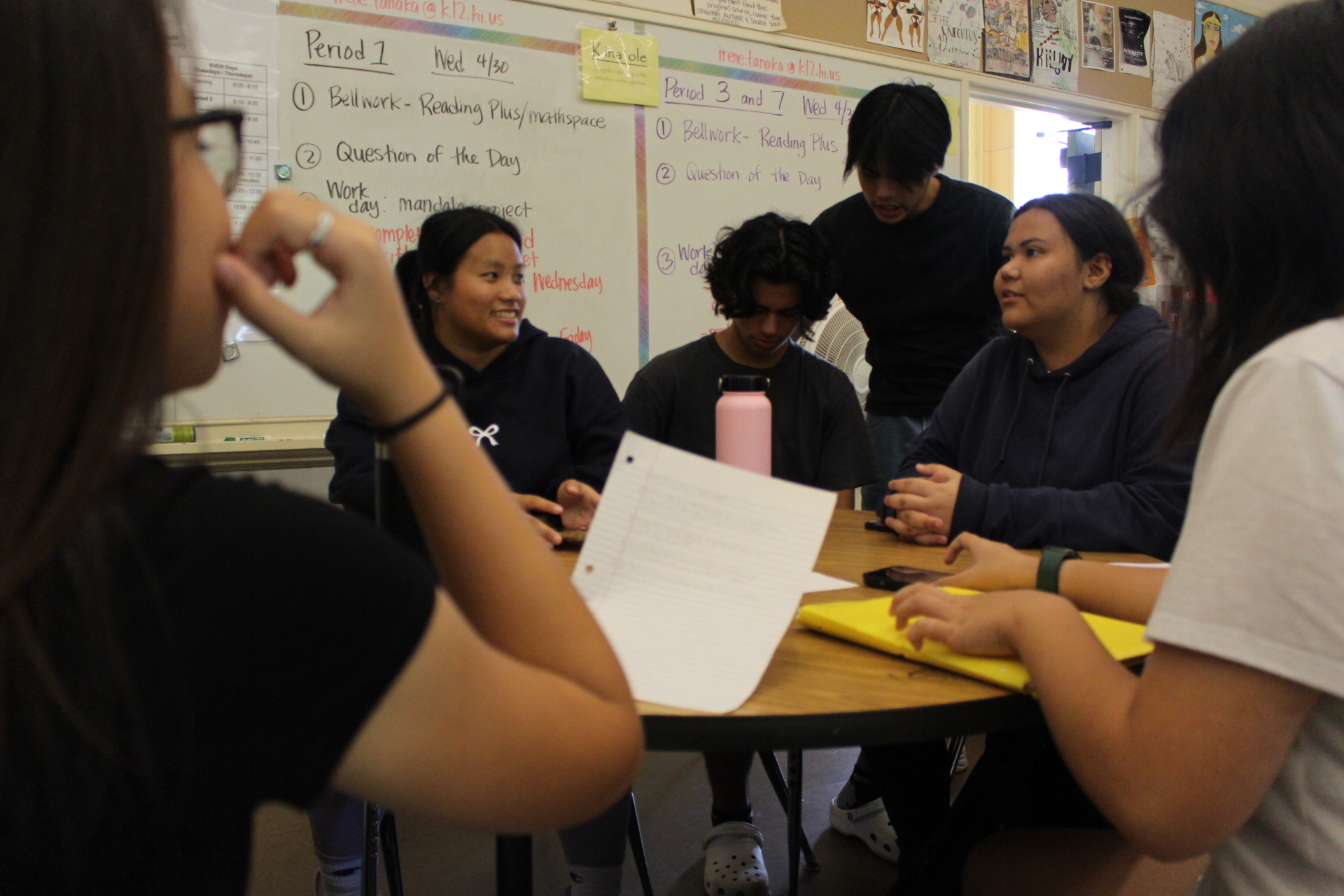
Lillian Franco (℅ ‘27), is in Tanaka’s 4th period honors class, playing the role of lead lawyer for the defense. As the lead, she has to write the opening and closing statements, while also making sure her team knows what to do. Franco said the defense has to ask questions about the prosecution, why they are prosecuting Odysseus and what exactly he is doing wrong.
Prosecution for the 4th period class is lead by Vedika Jadhav (℅ 27’) who is also Poseiden’s lawyer. Their goal is to prove Odysseus of his three main crimes. Jadhav said those crimes include breaking into the island of Cyclops, assaulting the cyclops and first degree murder of the suitors that took up residency in his palace.
Jadhav said the challenging part is the evidence and sharing it with the whole class. She said they have to make a slideshow containing their evidence, and then present it in front of the class.
“We were not allowed to put [the entire] text into the slideshow for evidence,” Jadhav said. “We kinda have to interpret how the other side is going to use the evidence.”
Franco said her team is currently to find evidence they need to deny the accusations, as their teamwork is being challenged.
“We’re getting there,” Franco said.
Franco said she wants to see how everything plays out as she also loves Greek mythology, and thinks “The Odyssey” is a good pick for the mock trial.
“[Odysseus] is innocent. He’s the greatest person,” Franco said.
Jadhav on the other hand believes Odysseus is guilty.
“Everything he did had intentions behind it. It wasn’t just fate or destiny,” Jadhav said. “ It was what he did that brought everything upon himself.”
When it comes down to the mock trial, both Franco and Jadhav said they enjoy it and find it unique. Franco hasn’t experienced anything similar to this in other classes, but said that it’s an interesting experience.
“Mock trials are modern day and Greek myths are ancient time, so combining the two is pretty cool,” Franco said.
Jadhav said usually during quarter four of the last semester she would need to write long essays and get lots of work. With Tanaka’s assignment Jadhav is able to bond with the class, learn about mock trials and myths while also improving her skills further.
“It’s really interactive and I think it also solves a problem of kids not engaging in class,” Jadhav said.
Instead of playing the role of a lead lawyer or lead prosecutor, Josey Le (℅ ‘27), Tanaka’s 6th period student, played the role of Odysseus. Le worked with his lawyers to get their direct examination questions [how the procedure feels], revisions and summaries to bring to the case. For example, with the situation with Polyphemus, Le had to summarize how he felt about the situation; including how he felt when Polyphemus ate one of his men. Le said it’s crucial because it justified why he, or Odysseus, assaulted him or how he felt the entire scenario.
“It really challenges how well we can communicate and work together,” Le said.
Harandel Mariano, Tanaka’s 6th period student, took on the role of the cyclops, the one accusing Odysseus for stabbing him in the eye. Mariano said he never done a mock trial before or one in class, so he finds this something new and realistic to how it’s done in actual court.
“He’s guilty of all charges,” Mariano said.
Le said as himself, not as Odysseus, that all his crimes were justified as a lot of things Odysseus did had built up to it. An example is his men being eaten by the cyclops and the suitors at his palace planning to kill his son.
“If I were a dad, I’d watch out for my kids too,” Le said.
Le said his favorite part would be talking with his lawyer, as he always wanted to be a lawyer as a kid. Seeing how the client has to work on the case, what the client has to do, how the client works with a lawyer and how the client presents themselves on the stand Le finds interesting. The mock trial not only helps with skills students need in English classes, but also helps develop an interest in law.
“Would we be good as lawyers? Will it be interesting as a lawyer?” Le said. “My friend seems to be really on top of it ever since Mrs.Tanaka gave the assignment.”
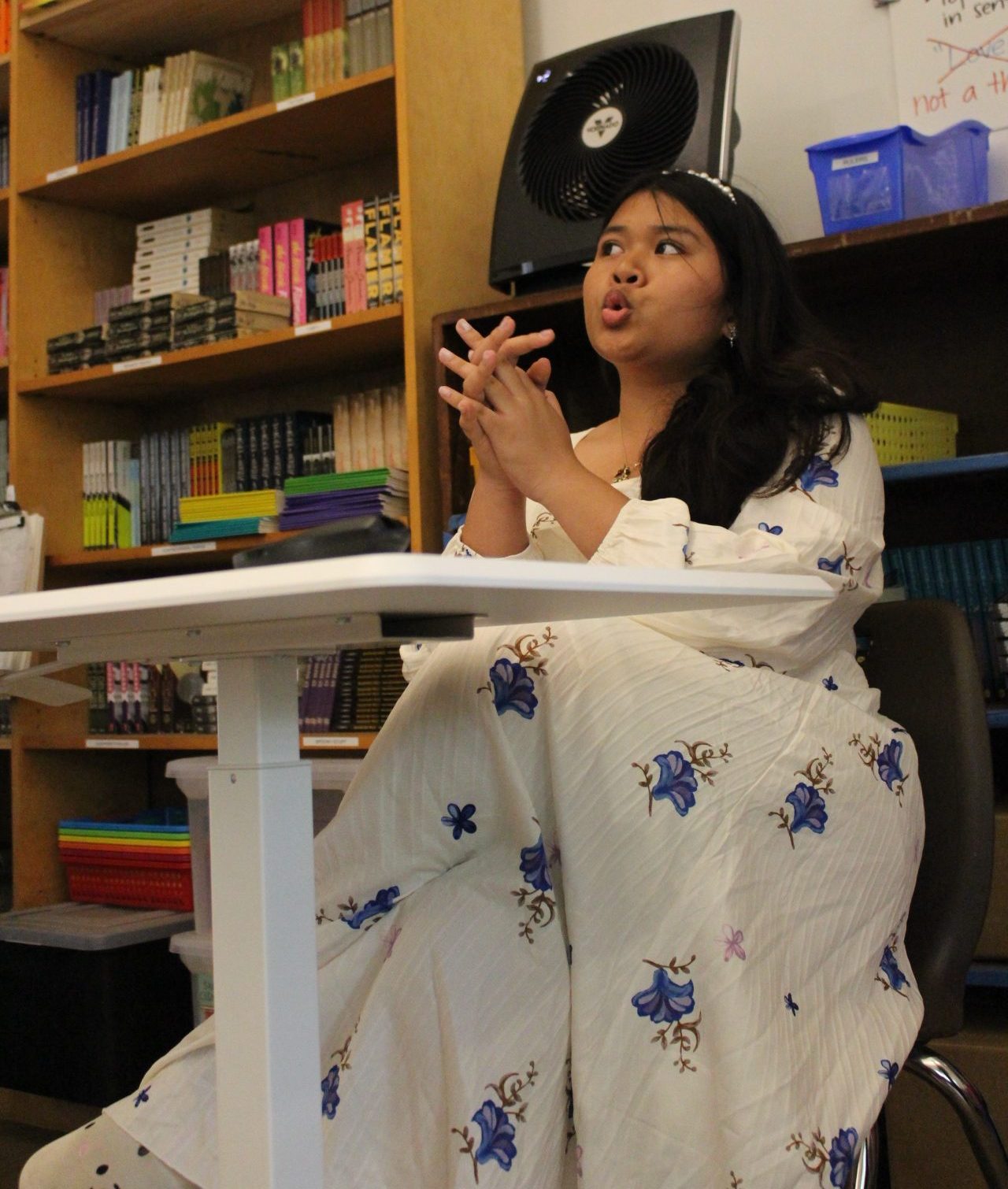
Note: Interviews have been conducted on the 1st day of trials and after the last day of trial
On Apr. 29, Vanelyn Amoguis (℅ ‘27), Tanaka’s 6th period student, sat in front of the entire class as she played Helen of Troy during the trial. As Helen, she was a witness to Odysseus’ crimes of trespassing as he was trying to help her get back to Sparta and back to her husband, Menelaus. Amoguis got into character as she dressed up as her, while trying her best to make sure everyone could hear her and understand her parts.
While up on the stands, Amoguis didn’t have enough time to finish as the bell for school to end rang, now having to finish during the next class period. Yet, this gives her time to reflect and improve for the continuation.
“[I’m going to] shorten my narratives and focus on what Odysseus did,” Amoguis said.
As the next two trials come, Amoguis is going to prepare by reviewing her evidence with the help of her lawyer.
“My lawyer will help me up because we do have strong evidence,” Amoguis said.
As herself and not her character, Amoguis believes that Odysseus is guilty of all the crimes he is being accused of.
“[Odysseus’s ego] is higher than mount Everest. He is like I’m the strongest dude ever and I’m the most handsome dude ever,” Amoguis said as herself. “You’re just a man. The gods helped you.”
For Franco, when her first day of the mock trial came to an end, it was certainly an interesting experience.
“During the trial we thought we had everything down, but doing it we were like ‘what is happening?’” Franco said.
During the trial Franco’s team would be objecting to her, trying to object the witness’s answers but were using the objections that would object her questions.
There was a moment during the trial where Helen of Troy for period 4 was on the stand, which left the classroom laughing and the jury silently judging.
“I said ‘why were you in Troy?’ He said ‘I was born in Troy,” Franco said.
Helen of Troy is in fact not born in Troy, but born in Sparta.
Despite the rocky start and prosecution doing better, Franco believes that defense will do better and when they get their information in it will sway the jury into believing that Odssyeus is innocent.
“It was the first day and we still had questions on what was happening,” Franco said. “We’ll, do better the second time.
As the final day rolled around on May. 6, Kobe Yang (℅ ‘27), watch from the sidelines as a jury foreman and attended for all three days during period six. As a jury foreman he discussed along with the other jurors on whether Odysseus is guilty for the crimes he is being charged of. Yang found the whole trial well made as it almost felt like an actual trial.
“Odysseus is morally right because of the circumstances, but when it comes to the law he is in the wrong,” Yang said.
Cura Yoon and Jude Marengo (both ℅ ‘27), Tanaka’s 6th period students, were a duo pair during the trial; which meant the two worked together more outside of the trial and prepared together. Yoon played the role of the witness, Calypso, while Marengo was her lawyer. Both on the side of production.
Yoon said her planning and organization improved from doing the mock trial while Marengo felt like his teamwork and improvising skills had improved.
“[The mock trial] taught you how to respond especially when you had no script,” Marengo said.
If given the chance Yoon would do it again, but as a lawyer while Marengo wished to keep his role as a lawyer.
“For people taking [10th grade English honors] next year, really prepare for it and make sure everyone is on the same team, “Yoon said.
As the trial came to a close, Tanaka debriefed with the jury members, discussing whether the students were able to argue for Odysseus’ innocents; also they also discussed the charges and prepared feedback for the students. Tanaka said that in both classes Odysseus was found guilty of trespassing into Polyphemus’ home, guilty of assault of Polyphemus which left him blind and not guilty of 1st degree murder of the suitors in his place.
“[The 1st degree murder] is the hardest to prove intent,” Tanaka said. “Connection between intent and the act itself was not proven.”
Period four had a good line of questioning, but wasn’t unable to make the connection. Instead of making the connection and pursuing their line of questioning, they just let it drop. Period six on the other hand had questions, but didn’t use their evidence sufficiently.
“The teamwork angle for one the class was a little bit iffy, but when they did the reflection afterwards they did recognize that, and they know how they have to work together a little bit more when they’re working on projects,” Tanaka said.
Tanaka said during one of the trials a student who played Antinous, one of the suitors, got cornered in the questioning.
“He said ‘Oh, you know I just did it for fun. It was a joke guys!’ when being questioned about the slaughter of the suitors.”
Tanaka said for any incoming freshmen going into 10th grade Honors English should remember the class is heavy in interaction, and should expect to not be working on their own all the time. Tanaka also said they should be able to know their classmates and work with their classmates, as for next year Tanaka will be holding the mock trial again during the 4th quarter.
“It was a successful unit. I hope the students enjoyed it.”
Aloha. The Pinion staff wants to send two students and one adviser to the JEA Spring Convention in Minneapolis in April 2026.
We are applying for a first-time attendee grant to cover lodging and registration fees. However, we could use your help to pay for travel.
We have other ways you can support The Pinion, too. Visit https://mhspinion.com/about to learn more.



